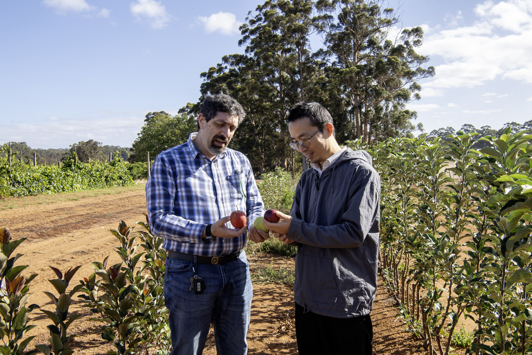Narrow orchard systems feature 2.5 m spaces between rows of fruit trees with a two-dimensional (2D) canopy. This exposes fruits and leaves to enough sunlight to maximise yield and fruit quality.
Scientists at the department are researching the potential benefits of narrow orchard systems at the Manjimup Horticulture Research Institute.
Background and benefits
There is growing evidence from Europe that narrow orchard systems create more sustainable businesses with less waste, improved labour use and greater profitability.
Narrow orchard systems will provide knowledge that supports an industry transition to ensure:
- better light distribution through the tree canopy
- consistent bearing including fruit set
- less orchard variation
- improved fruit uniformity, colour and size
- safer orchards that attract a labour force
- more profitable orchards due to lower operating cost (such as energy and labour)
- accelerated adoption of robotic and sensing technology
- climate resilient and environmentally sustainable orchards.
Our research
In August 2024, the Western Australian (WA) Government invested $1.2 million into a national narrow orchard systems project, which Agriculture Victoria is leading.
The goal of this research is to use sustainable, highly productive orchards to deliver consistently high-quality fruit to consumers.
The project will:
- evaluate various types of 2D canopy training systems and rootstocks.
- evaluate 3 Australian bred apples (including Bravo™/Soluna™) in the WA environment.
- explore the use of mechanisation, robotics, sensors and other ag-tech to support more efficient orchard management
- focus on boosting apple production from high density plantings in a narrow orchard system
- consider irrigation sensors to tailor water use, as well as autonomous ground vehicles, such as a mower and/or sprayer, to improve inputs efficiency. The department will develop guidelines for narrow orchard systems and tools for a range of fruit businesses.
The 5-year national Hort Innovation project is a collaboration with other states, universities and industry, including Pomewest and local ag-tech business Tobias Industries.

